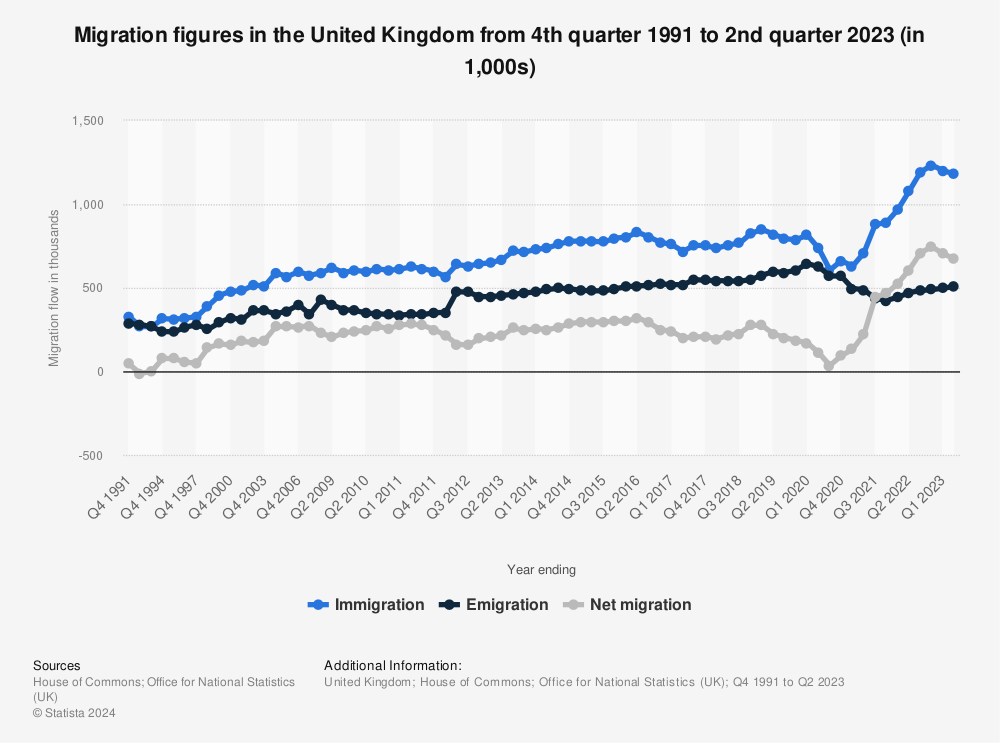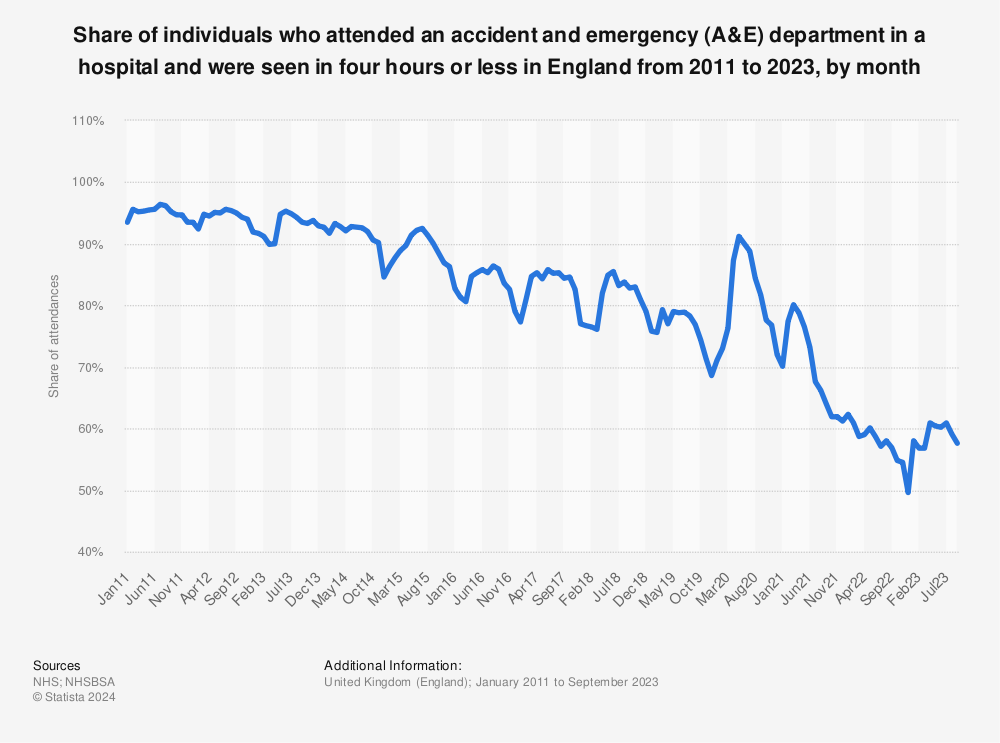Living in the UK is a rich and varied experience characterized by the country’s deep historical roots, a mix of different cultures, and ongoing innovation. This appealing combination has made the UK a popular destination, as seen in the significant number of people, around 1.16 million, who chose to migrate there in 2022.
But adapting to life in this Northern European nation comes with challenges, particularly for those new to the country. Determining if living in the UK is the right choice can be complex.
Prospective residents often wonder about the healthcare and education system, how the cost of living compares to other European countries, and what UK visa options are available. This article provides a candid look at these aspects and more. Let’s begin by discussing the upsides and downsides of weather, health, school systems, and overall life in Britain.
Healthcare in the UK
The National Health Service (NHS) is the heart of healthcare in the United Kingdom. It’s designed to give you comprehensive free healthcare when you need it. The NHS is mainly funded by taxes and National Insurance contributions, covering a wide range of services from doctor visits and hospital treatments to dental, eye care, and mental health services.

General practitioners (GPs) are often your first point of contact in the NHS. They are vital in looking after your health, from providing preventive care and diagnosing various conditions to referring you to specialist services. The NHS also handles complex health issues through hospital services and specialist consultations.
Healthcare is managed differently in Scotland, Wales, and Northern Ireland compared to England. Each region has its unique way of running things, like different policies in NHS Scotland and varied prescription charges in NHS Wales. Northern Ireland even combines health and social care services.
Besides the NHS, there’s a private healthcare sector in the UK. You might consider this for quicker access to treatment or services not fully covered by the NHS, like specific dental or eye treatments. As of January 2023, the average cost of a private health insurance policy in the UK is £86.07 per month, calculated for ages 20 to 70. If you’re under 50, you can typically expect to pay less than this average.
Pros
- Access to the NHS: The National Health Service (NHS) provides comprehensive healthcare services to all UK residents, primarily free at the point of use. This system ensures everyone can access medical care regardless of their financial situation.
- Quality of care: The NHS is known for its high standard of medical care, with skilled healthcare professionals and modern facilities. It consistently ranks well internationally in terms of efficiency, effectiveness, and overall quality.
- Wide range of services: The NHS covers a broad spectrum of healthcare services, from primary and emergency services to specialist treatments and long-term care. This inclusivity means that patients can receive comprehensive care under one system.
Cons
- Resource strain and underfunding: The NHS often faces challenges related to underfunding and resource shortages, which can impact the quality and timeliness of care. It’s a case of demand exceeding supply. For example, ambulance services have been facing an overwhelming increase in calls post-Covid. In April 2022, the emergency number 999 in England received 860,000 calls, a significant 20 percent jump from the same month in the previous year.
- Variability in service across regions: There can be significant variability in the availability and quality of NHS services across different areas of the UK, leading to a ‘postcode lottery’ in healthcare provision.
Long waiting lists: One of the significant drawbacks of the NHS is the extended waiting times for certain treatments and procedures. This delay can be due to the high service demand and resource constraints. In September 2023, only about 57 percent of patients in English A&E departments were seen within four hours, markedly below the 95 percent target. This rate is one of the lowest since 2011 and continues a downward trend in meeting the four-hour goal, last achieved in June 2013. This statistic tracks the monthly percentage of A&E patients in England who attended within four hours from 2011 to 2022.
Education in the UK
Though the UK’s healthcare system may not be among the world’s top 10, its education system attracts attention. In the 2021/22 academic year, UK universities welcomed 679,970 international students, including 120,140 from the EU and 559,825 from elsewhere, comprising 24% of the total student body.
The UK’s education system has four main stages: primary, secondary, further, and higher education. It’s also divided into ‘key stages’
- Key Stage 1 for ages 5-7
- Key Stage 2 for 7-11
- Key Stage 3 for 11-14
- Key Stage 4 for 14-16-year-olds.
Your child’s education will depend on which of the four countries you’re in: England, Scotland, Wales, or Northern Ireland, each with its approach. In England, children start with the Early Years Foundation Stage and progress through primary and secondary education, culminating in GCSEs and options like A-levels and vocational training.
Scotland’s system includes early education, a 7-year primary phase, and a secondary phase leading to Nationals and Highers. Welsh education follows a similar pattern, adding the Welsh Baccalaureate, while Northern Ireland’s system includes GCSEs, A-levels, and vocational options.
Education across the UK is compulsory from ages 5 to 16 (or 18 in England for continued education or training), focusing on core subjects and marked by standardized exams. Special Education Needs (SEN) provisions are in place to ensure inclusivity. UK higher education, known for its excellence, varies in tuition and funding across countries.
According to the British Council, the cost of studying in the UK depends on your study level and location. Humanities and social sciences are usually cheaper, while science and clinical degrees are pricier. On average, international undergraduate fees range from £11,400 to £38,000, about £22,200 per year—undergraduate courses in England, Wales, and Northern Ireland typically last three years, four in Scotland.
For postgraduates, international fees range from £9,000 to £30,000, averaging around £17,109 annually. Most UK postgraduate courses last one year and have quicker career re-entry and lower overall costs than two-year programs.
Pros
- Access to free education: The UK offers free education to all children from 5 to 18 years, providing equal learning opportunities.
- World-class universities: The UK is home to some of the world’s top universities, attracting global talent and fostering a high standard of higher education.
- Diverse Educational Options: Besides public schools, there are a variety of private and international schools catering to different educational philosophies and needs.
Cons
- Variable standard of public schools: The quality of education can significantly vary between different public schools, influenced by location and funding.
- High cost of university education: While primary and secondary education is free, university education can be pretty expensive, especially for international students.
- Pressure and competition: The education system can be highly competitive, with a strong emphasis on exams and academic achievement that could increase student pressure.
Weather in the UK

In 2022, the UK experienced its hottest year, averaging 10.03 degrees Celsius. All ten of the warmest years in the UK since record-keeping began in 1884 have occurred since 2002. The summer of 2023 was the eighth warmest, mainly due to record-breaking temperatures in June.
Seasons in the UK bring different weather patterns, such as:
- Mild springs
- Warm but rarely hot summers
- Cool and unpredictable autumn
- Cold winters with more snow in the north and higher elevations
Regional differences are significant, with the west and north being wetter and windier than the east and south. The Gulf Stream influences the climate, especially in winter, making it milder than other places at similar latitudes. Like many regions globally, the UK is experiencing changing weather patterns due to climate change, including more extreme events.
Pros
- Make the most of summer: People in the UK tend to fully embrace and enjoy the summer, engaging in outdoor activities and social events.
- Mild winters: Compared to other northern countries, UK winters are relatively mild, making it easier to manage for residents.
- Diverse weather conditions: The UK’s weather can vary and have distinct seasons.
Cons
- Unpleasant weather: The UK is known for its rainy and overcast weather, which can dampen outdoor activities and affect mood.
- Short daylight hours in winter: Winter months have very short days, affecting people’s mental health and daily routines.
- Unpredictable weather changes: Overall, the UK’s weather is mild but can change rapidly, often described as “four seasons in one day.
Lifestyle in the UK
Brits might seem reserved initially, but they’re just as warm and funny once you get to know them. Humor, incredibly self-deprecating, is key in the UK – it’s not a lack of confidence, just their way of being polite without bragging.
Understanding Brits can be tricky as they prefer hints to direct statements, but you’ll get the hang of it. And yes, they do love talking about the weather! The UK has festivals, from music to food, wellness, arts, and literary events. Each city has a food festival celebrating local and international cuisines.
Don’t stress about the different regional accents. Teachers and host families will speak clearly, and getting to grips with these accents is fun and valuable.
Pros
- Cultural hub: The UK, particularly cities like London, is a global center for arts, culture, and sporting events, offering a rich cultural experience.
- High standard of living: The UK generally offers a good quality of life, with access to various amenities, healthcare, and entertainment.
- Cultural diversity: Food, festivals, and everyday life reflect a wide range of cultural influences.
Cons
- Mediocre traditional cuisine: Traditional British food is often criticized for being bland or unexciting compared to other global cuisines.
- High cost of living: Especially in cities like London, the cost of living can be very high, making daily life expensive.
- Busy lifestyle: Life, particularly in urban areas, can be fast-paced and stressful, with a focus on work and productivity.
Culture Shock in the UK

Food plays a significant role in the UK’s culture, with traditional dishes like fish and chips, a full English breakfast, and a Sunday roast central to social gatherings. Tea is a cornerstone of British social life, often offered as a welcoming gesture in homes.
Reflecting the UK’s cultural diversity, especially in major cities like London and Manchester, you can find a wide variety of traditional cuisines from around the globe. Interestingly, the national dish has also shifted from fish and chips to chicken tikka masala, reflecting the influence of the South Asian community in Britain.
Pros
- Diversity: The UK’s diverse population means exposure to different cultures, languages, and traditions, enriching the cultural experience.
- Proximity to Europe: Easy access to other European countries allows for travel and cultural exchange, enhancing the overall experience.
- English language: As English is the primary language, it’s easier for many international visitors to adapt and communicate.
Cons
- Brexit impact: Post-Brexit changes have affected movement and residence rights, creating uncertainty and challenges for non-UK nationals.
- Cultural differences: Newcomers might experience a cultural gap in social norms, communication styles, and lifestyles.
- Weather adjustment: Adapting to the UK’s often gloomy and rainy weather can challenge people from sunnier climates.
Safety in the UK
According to the 2023 Global Peace Index report, the UK holds the 37th position, indicating it’s safe for students, workers, families, and retirees. Crime rates are generally on par with the European average, though they vary across different parts of the UK. Violent crimes are rare, with petty crimes being more common.
However, particular areas in British cities and towns might be less safe at night due to groups of drunk people. It’s also advisable to avoid wearing football shirts or supporting football teams in public, as intense rivalries between fans can sometimes escalate into violence.
The terrorism threat level in Northern Ireland is ‘severe,’ and the national level is ‘substantial,’ with risks from Islamic extremism, extreme right-wing ideology, and Northern Ireland’s status. Stay alert to terrorism risks, take official warnings seriously, and avoid protest areas.
Healthcare in the UK is of good standard. Ensure your vaccinations are current and that you have comprehensive travel insurance. Some healthcare is free for short visits, but a surcharge applies for more extended stays.
Drug offenses carry severe penalties. Avoid using or taking illegal drugs. Travel disruptions, like strikes, can affect various services. The UK is mostly very safe for women travelers. Check for updates if you’re traveling. Visas are usually not required for tourist stays under six months but check with the UK Home Office for extended visits or other purposes. Entry and exit rules can change, so keep updated through UK embassies or consulates.
Pros
Low violent crime rates: The relatively low rates contribute to a sense of security.
Efficient law enforcement and emergency services: The effectiveness of the police and emergency services in dealing with issues swiftly and professionally.
Cons
Rising knife and gang-related crime: Certain urban areas are experiencing an increase in knife and gang-related crimes.
Terrorism threat: Despite efficient security measures, terrorism remains a concern.
Surveillance and privacy concerns: Extensive use of CCTV and surveillance might raise privacy concerns for some individuals.
Working in the UK
People usually work a 37-40 hour week, Monday to Friday, with a growing trend for flexible hours and remote work to improve work-life balance. Workers get about 28 days of annual leave and benefit from family-friendly policies like maternity and paternity leave. There’s also more attention to mental health at work.
From August to October 2023, job vacancies in the UK dropped by 58,000 to 957,000, declining in 16 18 sectors. Regular pay (excluding bonuses) grew by 7.7% annually, a slight decrease from previous periods but still one of the highest rates since 2001. Total compensation, including bonuses, grew by 7.9% annually, influenced by one-off Civil Service payments.
Adjusted for inflation, total pay increased by 1.4% and regular income by 1.3%.
In September 2023, the UK experienced 229,000 lost working days due to labor disputes, mainly in health, social work, and education. Payrolled employees rose by 32,000 in September and another 33,000 in October, reaching 30.2 million.
In 2023, the median annual earnings in the UK were £34,963, with significant regional variations. London had the highest median salary at £44,370, while the Northeast had the lowest at £31,200. The Southeast and Scotland also had above-average earnings.
Your ability to work in the UK depends on your immigration status, with various categories allowing this right, including British or Irish citizenship and other visas.
You can work in the UK if you:
- Are you a British or Irish citizen?
- Have pre-settled or settled status from the EU Settlement Scheme or are waiting for a decision on your application.
- Have a family permit from the EU Settlement Scheme.
- Have indefinite leave to enter or remain in the UK.
- Have the right of abode in the UK.
You might also have the right to work if you have a visa with a time limit (limited leave to enter or remain).
However, you cannot legally work in the UK if:
- You entered the UK illegally.
- Your permission to stay has expired.
For commuting, popular transportation options include trains, buses, the London Underground, trams, cars, and bikes. In 2021, 68% of Britons drove to work, but only 27% used a car in London. Most towns have train connections, though smaller areas might have less frequent service.
Monthly travel costs average around £140, with public transport like the tube being cost-effective but unavailable everywhere. Running a car costs about £3,500 per year per vehicle while spending on public transport is about £1,300 per year, mainly on buses, trains, and tubes.
Pros
- Strong labor laws: The UK has robust laws protecting employees’ rights, ensuring a fair work environment.
- Generous employee benefits: Benefits like paid, maternity, paternity, and sick leave are typically more abundant than in many other countries.
- Diverse job market: The UK offers various employment opportunities across multiple industries.
Cons
- Highly competitive job market: The job market can be extremely competitive, especially in sought-after sectors and top companies
- Cost of living and wage disparity: While there are ample job opportunities, the cost of living, especially in major cities like London, is high, and salaries sometimes fail to keep up, leading to challenges in affording a comfortable lifestyle.
- Long working hours: Despite solid labor laws, there can be a culture of long working hours in specific industries, impacting work-life balance.
Living in the UK: Top Cities to Work and Reside
People mainly move to the UK for work or education. While London has the most migrants in the UK, making up 37% of the foreign-born population, it’s not always the best choice for new workers or students due to its high cost.
Other areas offer better affordability and opportunities for education and business. Below are notable cities in the UK to live and work in.
Manchester
Manchester has a hidden network of underground canals and tunnels, initially used for transporting goods during the Industrial Revolution. These now-abandoned underground passages are fascinating for those interested in history.
Why live in this part of the UK?
- Innovative tech and creative hub: Manchester is rapidly emerging as a ‘Silicon Valley’ of the UK, attracting tech enthusiasts, innovators, and creative minds.
- Sports fanatics haven: Home to two of the world’s most famous football clubs, Manchester United and Manchester City, it’s a dream city for football fans.
- Music and nightlife: Known for its influential music scene (birthplace of bands like Oasis and The Smiths) and vibrant nightlife, it’s perfect for music lovers and social butterflies.
Ideal for: Tech professionals, sports enthusiasts, music lovers, and young professionals who thrive in a dynamic, fast-paced environment.
Edinburgh
Known for its dramatic landscape, Edinburgh is built on a series of extinct volcanoes and rocky crags – a geological foundation that gives the city its unique and rugged terrain.
Why live in this part of the UK?
- Historical and cultural richness: Edinburgh’s stunning architecture and rich history, including the famous Edinburgh Festival, make it a culturally enriching place to live.
- Natural beauty and quality of life: The city offers a high quality of life with its scenic landscapes, including Arthur’s Seat, and proximity to the Scottish countryside.
- Educational excellence: Home to prestigious universities, Edinburgh is ideal for students and academics, offering a robust educational environment.
- Festival City: Edinburgh is famous for its annual international festivals, including the Fringe, appealing to arts and culture enthusiasts.
Ideal for: History and culture enthusiasts, academics, and those looking to balance city living and natural beauty.
Leeds
Leeds Carnival is home to one of the UK’s oldest Caribbean carnivals, predating London’s more famous Notting Hill Carnival. This vibrant event showcases the city’s diverse cultural heritage.
Why live in this part of the UK?
- Economic growth and job opportunities: Leeds has a rapidly growing economy, especially in finance, retail, and digital industries, offering diverse job opportunities.
- Affordable living: Compared to other major UK cities, Leeds offers a more affordable cost of living, making it attractive for young professionals and families.
- Vibrant student life: With several universities, the city has a bustling student life and youthful energy, alongside a thriving nightlife and music scene.
Ideal for: Students, young professionals, and families looking for an affordable yet dynamic urban experience.
Oxford
Oxford is home to the Bodleian Library, one of the oldest libraries in Europe, with collections so extensive that the books are stored in miles of underground bookshelves beneath the city’s streets.
Why live in this part of the UK?
- Academic excellence: Known worldwide for the University of Oxford, the city is a hub for educational and intellectual pursuits, attracting students and scholars.
- Historical and architectural Beauty: Oxford’s historical buildings and picturesque streets offer a unique living experience steeped in history.
- Cultural and literary significance: The city’s literary history and ongoing cultural activities make it a haven for writers, academics, and culture lovers.
Ideal for: Academics, students, and those who appreciate a blend of history, culture, and intellectual stimulation.
Birmingham
Birmingham has more miles of canals than Venice, often surprising visitors with its extensive network of waterways, which have been revitalized into lively public spaces.
Why live in this part of the UK?
- Diverse and multicultural community: Birmingham is one of the UK’s most culturally diverse cities, offering a rich mix of cultural experiences and cuisines.
- Economic hub: As the UK’s second-largest city, Birmingham has a strong economy with opportunities in the manufacturing, engineering, and service sectors.
- Vibrant city life with green spaces: The city combines urban living with access to green areas like Sutton Park, appealing to those who want to balance the city and nature.
- Culinary diversity: Known for its culinary scene, including the famous ‘Balti Triangle,’ Birmingham is a food lover’s paradise.
Ideal for: Families and professionals seeking a multicultural urban environment with a balance of economic opportunities and quality of living.
Cost of Living in the UK

Compared with Canada, consumer prices in the UK are 5.1% lower without rent and 6.1% lower with rent. Rent is 8.3% cheaper in the UK, but restaurant prices are 7.0% higher. However, grocery prices are 21.9% lower in the UK.
As for Australia, the UK’s consumer prices are 14.8% lower without rent and 16.3% lower with rent. Rent prices are 19.7% cheaper, and groceries are 29.0% lower in the UK than in Australia.
According to data from Numbeo, here’s what you can expect to spend while living in the UK.
Average expenses for individuals and families in the Uk
Family Size | Monthly Cost (€) | Monthly Cost (£) |
Family of Four | 2,988.0 | 2,598.9 |
Single Person | 876.5 | 762.4 |
Restaurant prices in the UK
Item | Price Range (£) |
Meal, Inexpensive Restaurant | 8.50 - 27.38 |
Meal for 2, Mid-range Restaurant | 40.00 - 100.00 |
McMeal at McDonalds | 5.50 - 8.00 |
Domestic Beer (0.5 liter draught) | 3.00 - 6.07 |
Market prices in the UK
Item | Price Range (£) |
Milk (1 liter) | 0.64 - 1.55 |
Loaf of Fresh White Bread (500g) | 0.60 - 2.00 |
Rice (1kg) | 0.70 - 2.50 |
Transportation costs in the UK
Item | Price Range (£) |
One-way Ticket (Local Transport) | 2.00 - 4.50 |
Monthly Pass (Regular Price) | 50.00 - 180.00 |
Taxi Start (Normal Tariff) | 1.80 - 5.00 |
Utilities costs in the UK (monthly)
Description | Price Range (£) |
Basic Utilities for 85m2 Apartment | 120.00 - 400.00 |
Mobile Phone Monthly Plan | 10.00 - 20.00 |
Internet (60 Mbps or More) | 25.00 - 45.00 |
Childcare costs in the UK
Description | Price Range (£) |
Preschool, Full Day, Monthly | 750.00 - 1,714.00 |
International Primary School, Yearly | 9,000.00 - 25,000.00 |
Rent and apartment prices in the UK
Description | Price Range (£) |
Apartment (1 bedroom) in City Centre | 542.60 - 2,282.23 |
Apartment (3 bedrooms) in City Centre | 1,000.00 - 4,142.22 |
Salary and financing in the UK
Description | Amount (£) |
Average Monthly Net Salary | 2,320.96 |
Mortgage Interest Rate, Yearly | Variable |
How to Move and Start Living in the UK

Traditionally, visas are stamps in your passport, but the UK is moving towards digital biometric seals for enhanced security. The UK government’s official website provides detailed information on various visa categories and their requirements.
Below, you can find a recap of the eligibility, types, conditions, and the route to British citizenship.
When you need a UK Visa
Citizens of the Commonwealth, the European Economic Area, and Switzerland typically do not need a UK Visa. You can find out if you need a visa from your country of citizenship by using the visa checking service here.
Standard UK Visa requirements
Typical requirements for all UK visa types include:
- A valid passport with at least six months remaining.
- Completed application form with the fee paid.
- Recent, specification-compliant photographs.
- Proof of financial support for your stay.
- Travel itinerary and hotel bookings.
- Biometric information for holidays over six months.
- Additional supporting evidence like personal statements or invitation letters.
Visa types available
The visa types can be short or long-term. The UK offers tourist, refugee, worker, and family reunions visas.
Short term Visas
This includes short-stay tourist visas, study visas, and transit visas.
Tourist Visa
- Valid for up to 6 months and costs £93.
- You can’t work but can study for short courses (under 30 days).
- Application should be made in your country of residence.
Entrepreneur Visa (Tier 1)
- For setting up or running a business in the UK.
- Requires a minimum of £50,000 in investment capital.
- Allows a stay of up to 3 years and 4 months, extendable.
- Family members can join but need separate applications.
Investor Visa
- For non-European Economic Area nationals with £2,000,000 to invest in the UK.
- It allows a 3-year and 4-month stay, extendable, with limited work and study restrictions.
- Family members can accompany the primary applicant.
Family Visa
- Stay with a family member in the UK for over six months.
- Application time varies depending on where you apply.
Other forms of short-term study visas to the UK can be:
- UK Transit visa
- Permitted paid engagement visa
- Marriage visitor visa
- Parent of a Tier 4 child visa
- Visit the UK in a Chinese Tour Group visa
Long-Term Visas
- These include the work visa, student visa, or family living exceeding 6 months.
- After 5 years, you may be eligible for residency or Indefinite Leave to Remain (ILR), leading to citizenship.
Qualifying for permanent residency and British Citizenship
To qualify for permanent residency and British Citizenship in the UK, there are specific criteria you need to meet, which can differ based on your situation. Let’s take a quick look at what these requirements generally involve.
Permanent residency
To get the UK permanent residency, or Indefinite Leave to Remain (ILR), you generally need to have lived legally in the UK for five years. This includes staying out of serious legal trouble and passing the “Life in the UK” test, which covers British culture, history, and traditions. It would be best to show you can speak and understand English to a certain level.
Different paths like employment, family ties, or other long-term visas can lead to ILR. If you’re on a work visa, keep your job and stick to the rules of your visa.
UK citizenship
For British Citizenship application, after you’ve had ILR for a year, you can apply, provided you’ve lived in the UK for at least five years and haven’t been away for more than 450 days during those years (and no more than 90 days in the last year). Along with passing the “Life in the UK” test and proving your English skills, you’ll need to show you’re of good character, meaning no severe or recent criminal history. Applying involves giving your biometric information and, once approved, going to a citizenship ceremony.
If you’re married to a British citizen, you can apply for citizenship right after getting ILR, as long as you’ve been in the UK for three years.
Additionally, you could go through the UK’s citizenship by investment route. This is for those who can invest significant money in the UK. Typically, you need to invest millions of pounds in the UK economy, which can lead to a faster route to ILR and citizenship. This option requires detailed financial and legal planning and is best pursued with professional advice.
Frequently Asked Questions about Living in the UK
Is the UK a good place to live?
The UK, comprising four countries – England, Scotland, Wales, and Northern Ireland, is often considered an excellent place to live due to its free healthcare system (NHS), cultural diversity, and strong education system. The country’s small size belies its immense cultural and historical wealth, from the Scottish Highlands to vibrant music venues and art galleries in its big cities.
What are the disadvantages of living in the UK?
Living in the UK can have some downsides. The UK tax system can be complex, especially for American expats adjusting to life here. Housing can be expensive, with terraced houses in urban areas being particularly sought after. The weather can be challenging, and you’ll hear a variety of regional accents, reflecting the diverse population.
Is it better to live in Canada or the UK?
Choosing between Canada and the UK depends on personal preferences. Canada boasts wide-open spaces and a lower cost of living, while the UK offers a unique experience in terms of history, culture, and a more compact, small country feel. The UK government provides stability and extensive public services, but bureaucratic processes can differ significantly from Canada’s.
Is it a good idea to live in the UK?
Living in the UK is appealing if you appreciate a multicultural environment with access to quality healthcare and education. The UK is particularly attractive for those considering studying abroad or looking for diverse visa options. However, it’s essential to be comfortable with the cost of living and the climate.
What's it like living in the UK?
Life in the UK is a mix of traditional and modern influences. You’ll find a strong pub culture, a passion for sports, and a close-knit community feel in many areas. For expat life, particularly for American expats, the UK offers a familiar yet distinctly different way of living.
Is living in the UK expensive?
The cost of living in the UK varies. Cities like London can be expensive, but the four nations of the UK – England, Scotland, Wales, and Northern Ireland, each offer different lifestyles and costs. The UK’s free healthcare can offset some living costs, though housing and transportation remain significant expenses.
What is the lifestyle in the UK?
The UK lifestyle balances work and leisure, with a focus on socializing in pubs and cafes. The country is renowned for its cultural activities, including theater, museums, football, and cricket, reflecting Britain’s diverse and rich culture.
What should I expect when meeting new people in the UK?
Meeting new people in the UK can be a rewarding experience. British people are known for their politeness and understated sense of humor. In most places, you’ll find that people are friendly and open to making new friends, especially in social settings. In big cities, you might find a more diverse and fast-paced environment, while rural areas offer a sense of community and close proximity to neighbors. If you’re an American living in the UK, you’ll notice some cultural differences, but most people here are welcoming and respectful.
How does the healthcare system work for expats in the UK?
The UK is renowned for its National Health Service (NHS), which provides free healthcare to residents. As an expat, once you are a legal resident, you can access the NHS, which covers almost everything from general practitioners to specialists. Over the past few years, the NHS has made significant improvements to accommodate the growing population. It’s important to understand your visa options and ensure that your visa application includes healthcare access. Remember, healthcare standards can vary across the United Kingdom, but the NHS is a cornerstone of British life.
What are the highlights of UK's countryside and cities?
Living in the UK offers a diverse experience. The English countryside is known for its picturesque landscapes and narrow roads, offering a peaceful retreat. Green spaces are abundant, and areas like the Scottish Highlands provide breathtaking scenery. In contrast, big cities in the UK are vibrant and full of life, with numerous music venues, good food, and efficient public transport. Most places are in close proximity to both urban and rural settings, allowing for a balanced lifestyle. Whether you prefer the tranquility of rural areas or the excitement of urban life, the UK offers a blend of both.








